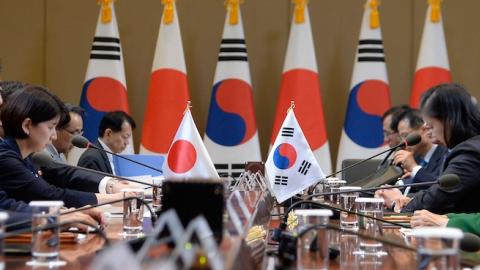There is a common complaint that there are more summits between regional leaders in East Asia than in any other part of the world, usually with few outcomes and little reward. Even so, the one that took place on Monday between Japanese Prime Minister Shinzo Abe and South Korean President Park Geun-hye is highly significant.
Since coming to power in 2013, Park has refused all invitations to meet with Abe in a bilateral setting on the basis of outstanding historical grievances stemming from the first half of last century.
In finally agreeing to meet and discuss a possible way forward with its neighbor over historical and other issues, the region will breathe a little easier.
Most attention might be on the relationship between the U.S. and China when it comes to shaping the future economic order in Asia. But frosty relations between Japan and South Korea became a distraction, and warmer relations between the two might well be essential to good solutions.
'Liberal' Economic System
Take the preservation of a so-called liberal system of economic rules that has allowed the greatest explosion of wealth compared to any other region in the second half of the previous century.
An open and liberal economic system does not predetermine who the winners and losers might be. In this sense, Chinese accusations that an economic liberal order is designed to suppress its economic rise makes little sense, especially given that China has been the biggest beneficiary of such a liberal order over the past few decades.
But a liberal economic order does insist on rules as to how nations and individual firms compete. This includes rules about protecting and respecting intellectual property and promises to allow market access to outsiders based on multilateral and bilateral agreements.
More broadly, liberalism demands a broad separation between national and political objectives on the one hand, and the commercial activity and goals of firms on the other.
When it comes to empirical proof of why the liberal economic order is worth defending, observers will rightly point to the examples of South Korea and Japan, in addition to Taiwan and Singapore. All represent admirable destinations for once authoritarian capitalists.
China's respect for the rules of the liberal economic order is more uncertain, and the ultimate destination of its political-economy is more unclear.
On the one hand, it has emerged as the leading trade partner for both these and many other countries in dollar terms, making it an indispensable economic partner to every country in Asia.
On the other hand, China is becoming a less rather than more welcoming place for foreign firms despite its membership in economic institutions such as the World Trade Organization. It has become the region's leading perpetrator of intellectual property theft, including through cyber means. And its enormous state-owned-enterprises are given advantages though cheap capital, tax concessions, subsidies and other regulatory privileges on a scale that is unprecedented since the emergence of the regional economic order after World War II. In short, China seems less a responsible stakeholder the larger and more powerful it becomes.
This gets us back to Japan and South Korea. Both remain the leading Asian exporters of innovation, advanced technology and know-how into the region — the prerequisite for any country, including China, to escape the dreaded middle-income trap and become an advanced economy.
It is no surprise that these two countries remain the two largest Asian sources of foreign direct investment into the region, while China is still a minor player in this regard. South Korean and Japanese firms continue to play a more constructive and decisive role in advancing the potential of developing countries in Southeast Asia than do Chinese counterparts.
The Collective Power of Japan and South Korea
The point is that Japan and South Korea have more leverage and importance in the region than each might imagine. It will not be easy for China to ignore the collective urgings of its advanced economy neighbors if such advocacy is performed in a coordinated fashion — with American and European economies adding considerable weight to such collective pressure on China.
This brings us back to the first ever bilateral meeting between Abe and Park. By spurning summits with Tokyo and joining with Beijing to use history in the first part of the previous century to embarrass Japan, Park had been inadvertently playing into Chinese hands by weakening the role Japan can play in using its weight to help promote the kind of regional order which serves South Korea's and Asia's interests.
But even as no tangible outcomes were announced, the two most powerful Asian liberal economies are at least prepared to discuss what they have in common — such as support for the Trans-Pacific Partnership that seeks to enforce liberal trading and economic rules — and find a way forward on differences.
To be sure, there is a long way to go. But the region ought to urge the continuation of any diplomatic thawing between the two countries. This week has been a small first step toward Asia's two most powerful economies working together in shaping an order that will ultimately benefit all its participants.
















